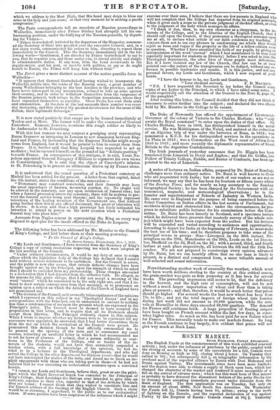The following letter has been addressed by Mr. Maurice to
the Council of King's College, and laid before them at their meeting yesterday.
" To the Council of King's College.
" 21, Queen Square, Bloomsbury, Nov. 7, 1853. "My Lords and Gentlemen—I have received from the Secretary of King's College a copy of certain resolutions respecting me which were adopted at the last meeting of the Council.
"tinder ordinary circumstances, it would be my duty at once to resign- offices which the legislative body of the College has declared that I cannot hold without serious detriment to its usefulness.. But the Council is aware, and the public is now also aware, that certain definite charges have been brought against me by the Principal, upon the strength of which he asked that °I should be excluded from my professorship. These charges amounted to a declaration that I had departed from the orthodox faith. Ile alleged, as- his reasons for this grave charge, that I did not accept a meaning of the word 'eternal' which he considered to be the only right one, and that I re- fused to draw certain consequences from that meaning, or topronounce an opinion upon a subject on which the Articles of the Church of England have not pronounced one. "The decision of the Council, as it avowedly takes cognizance of the opinions which I expressed on this subject in my 'Theological Essays' and in my correspondence with the Principal, can be understood to amount to nothing less than a condemnation of meupon the grounds which are expressed in the Principal's letter. The Council must be deemed to have accepted the propositions in that letter, and to require that all its Professors should accept them likewise. The Principal evidently shares in this opinion. When I wrote to inquire whether my lectures were to be continued till my successors were appointed, he answered, that I had better discontinue them from the day on which the resolutions of the Council were passed. He pronounced this decision though he had officially commanded me to be present at the opening of the term and to commence my usual courses, retracting an unofficial letter in which he had recommended me to ask for leave of absence. I submit, that a person ordinarily so cour- teous to the Professors of the College, and so tender of the in- terests of the students, would not have thus summarily suspended a teacher whom, with a full knowledge of his opinions, he had in- vited to be a lecturer in the Theological department, and who had served the College in the other department for thirteen years—that he would not have interrupted the studies of the term, and forced me to break an im- plicit engagement with those who are taking part in them—if he had not believed that he was executing an ecclesiastical sentence upon a convicted heretic.
" I cannot, my Lords and Gentlemen, believe that, great as are the psivi. leges which the Right Reverend Bench has conceded to the Principal of King's College, their Lordships the Bishops ever intended to, give him• an authority superior to their own, superior to that of the Articles by which they are bound ; I cannot think that they wished to conatitate him and the Council arbiters of the theology of the English Church. Such a claim would be as alarming, I apprehend, to the public as to our ecclesiastical rulers. If some parents have been suspicious of the influence which I might exercise over their sons, I believe that there are few parents in England who will not complain that the College has departed from its original principle, when it gives such a scope to the private judgment of its chief officer, or even to the judgment of the body which manages its affairs. "I think it due, then, to any own character as a clergyman, to the in. tercets of the College, and to the liberties of the English Church, that I should call upon the Council, if they pronounce a theological sentence upon me at all, to declare what article of our faith condemns my teaching. I conjure them not to use any phrases in condemning me which they would reject as loose and vague it the property or the life of a fellow-citizen were in question. Whether I have unsettled the faith of my pupils, by giving an interpretation of the word eternal' which I had maintained to be true (and especially important for students in Divinity) before I was asked to join the Theological department, the after lives of those pupils must determine. But if I have violated any law of the Church, that law can be at once pointed out—the nature of the transgression can be defined, without any re- ference to possible tendencies and results. It is this justice, and not any personal favour, my Lords and Gentlemen, which I now request at your hands.
"I have the honour to be, my Lords and Gentlemen, "Your obedient servant, F. D. Manatee.
" P.S. I have requested the Secretary to lay before the Council some copies of my Letter to the Principal, to which I have added some notes. I would respectfully call the attention of the Council to the Note B, page 31, of the pamphlet." After reading this letter, the Council decided that they did not think it necessary to enter further into the subject ; and declared the two chairs held by Mr. Maurice in the College to be vacant.


































 Previous page
Previous page